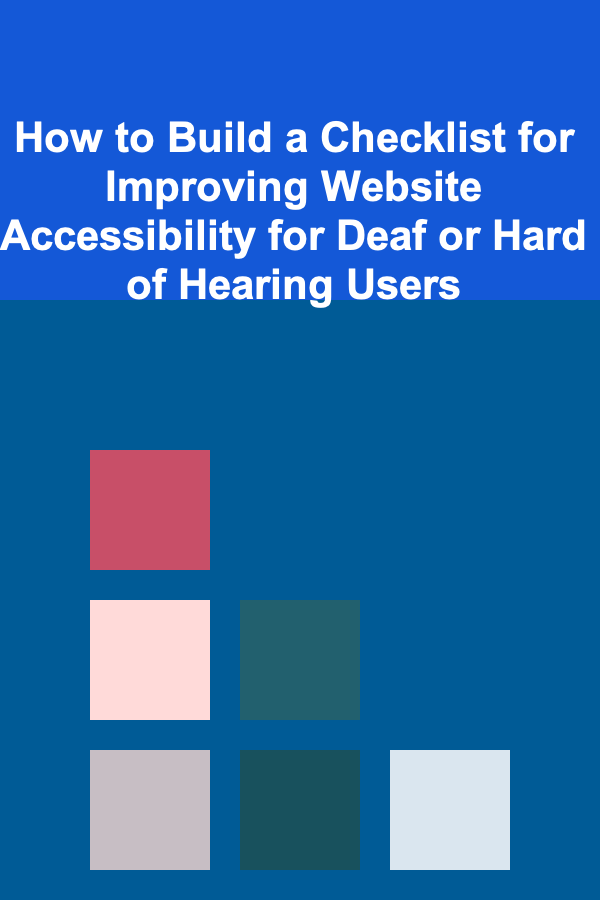
How to Make Money Online as a Quality Assurance Analyst: 10 Actionable Ideas
ebook include PDF & Audio bundle (Micro Guide)
$12.99$11.99
Limited Time Offer! Order within the next:

In the ever-evolving world of technology, the role of a Quality Assurance (QA) Analyst has become increasingly essential. With businesses relying heavily on digital products and services, the demand for skilled QA professionals has risen. Traditionally, QA analysts worked on-site at tech companies or within software development teams. However, as the world has shifted to remote work and freelancing opportunities have exploded, QA analysts now have more flexibility than ever to pursue online career options.
In this article, we'll explore 10 actionable ways for a Quality Assurance Analyst to make money online. Whether you're a seasoned QA professional or just starting, these strategies will help you leverage your skills and explore new ways of earning income.
Freelance QA Testing
Why It Works:
Freelance QA testing offers flexibility and the opportunity to work with a variety of clients. Many businesses, especially startups, seek experienced QA professionals to ensure the quality of their products without the need for a full-time, in-house team. This presents an excellent opportunity for QA analysts to monetize their skills.
How to Get Started:
- Create a Profile on Freelance Platforms: Websites such as Upwork, Freelancer, and Fiverr are great platforms to find freelance QA testing jobs. Tailor your profile to highlight your skills in functional testing, performance testing, and test automation.
- Set Up Your Own Portfolio: Display examples of your previous work, whether it's testing software applications, websites, or mobile apps. Having a portfolio gives potential clients a glimpse of your work quality and expertise.
- Start Small and Build Relationships: As you begin, consider taking on smaller projects or offering discounts to build up a reputation. Happy clients will provide referrals, which is one of the best ways to grow your freelance business.
Actionable Tip:
Focus on specific niches, such as mobile app testing or web automation, to differentiate yourself from the competition and attract specialized clients.
Test Websites and Mobile Apps for Usability
Why It Works:
Usability testing is a crucial aspect of the user experience. Businesses are constantly looking for testers who can provide insights on how users interact with their products and identify usability issues. As a QA analyst, your keen eye for detail can be an asset in this area.
How to Get Started:
- Sign Up for Usability Testing Platforms: Websites like UserTesting, UserFeel, and TryMyUI allow testers to get paid for evaluating websites and mobile apps. These platforms connect businesses with real users to test their websites, providing feedback on functionality and user experience.
- Follow Testing Guidelines: Make sure you follow the guidelines for each platform and provide thoughtful, detailed feedback. This will increase your chances of being selected for future testing opportunities.
Actionable Tip:
Experiment with various types of usability tests, such as A/B testing or remote user testing, to diversify your skill set and increase your appeal to a wider range of clients.
QA Automation as a Service
Why It Works:
Automation is becoming a standard practice in software development, and businesses are keen to save time and resources by automating their QA processes. If you're skilled in tools like Selenium, Appium, or JUnit, you can provide automated testing as a service.
How to Get Started:
- Learn Automation Tools: If you're not already familiar with QA automation tools, take courses to learn them. There are plenty of free and paid resources available, including online tutorials and platforms like Udemy, Coursera, or Pluralsight.
- Offer Automation Testing Services: Once you're proficient, offer your services to clients who need automated test scripts for their websites, apps, or software. Automation saves time and reduces human error, making it a highly valuable service.
- Automate Your Own Testing Processes: By automating repetitive tasks, you'll become more efficient, enabling you to take on more clients or projects.
Actionable Tip:
Build and maintain a repository of automated test scripts to showcase your work. Having a collection of reusable scripts can save you time and help you demonstrate your capabilities to potential clients.
Start a QA Blog or YouTube Channel
Why It Works:
If you have strong communication skills, sharing your knowledge through blogs or videos can open up additional income streams. Teaching others about QA concepts and best practices can help you build an audience and attract opportunities such as sponsored content, affiliate marketing, and consulting gigs.
How to Get Started:
- Pick a Platform: Start a blog using platforms like WordPress or Medium, or create a YouTube channel focused on QA testing. Write about your experiences, testing methodologies, best practices, and software tools.
- Monetize Your Content: Once you have a steady following, you can monetize your content through ads, affiliate marketing, or sponsored posts. For YouTube, you can join the YouTube Partner Program and earn revenue through ads.
- Promote Your Content: Share your content on social media, LinkedIn, and relevant online communities to attract viewers and build your brand.
Actionable Tip:
Consider offering free resources like checklists, templates, or eBooks in exchange for email subscriptions. This helps build your audience and provides additional monetization options like email marketing.
Provide QA Consulting
Why It Works:
Many businesses, especially smaller ones or startups, lack the in-house expertise to properly implement QA strategies. As a QA consultant, you can offer advice and strategies on setting up a testing environment, choosing testing tools, and improving overall product quality.
How to Get Started:
- Identify Your Niche: Decide which areas of QA you want to specialize in, such as test automation, performance testing, or test case design.
- Build Your Reputation: Network with other professionals in the QA industry and start building your reputation as an expert. Offer free consultations or workshops to showcase your expertise.
- Set Clear Service Offerings: Whether it's performing a QA audit or helping teams implement continuous testing, make sure your services are clear and well-defined to attract clients.
Actionable Tip:
Offer tiered consulting packages with different levels of service, such as basic QA advice or full-scale process implementation, to cater to businesses with varying needs.
Create and Sell QA Testing Courses
Why It Works:
Online learning has become a dominant industry, and many people are looking to enter the QA field. If you have significant experience, you can create and sell online courses, helping others learn how to become proficient QA analysts.
How to Get Started:
- Choose a Platform: Platforms like Udemy, Teachable, or Skillshare allow you to create and sell courses. Alternatively, you can host your courses on your own website.
- Design Your Course: Plan your course around core QA concepts, including manual testing, automation testing, bug tracking, and reporting. Make sure to include practical examples and hands-on exercises.
- Market Your Course: Promote your course on your blog, social media, and professional networks. Additionally, you can offer free webinars or short content to attract an audience.
Actionable Tip:
Make your courses interactive by including quizzes, assignments, and peer discussions. This will engage students and encourage them to share your course with others.
Bug Bounty Programs
Why It Works:
Bug bounty programs allow individuals to get paid for identifying and reporting security vulnerabilities in software or websites. If you have a keen eye for detail and are familiar with security testing, this can be a lucrative way to make money online.
How to Get Started:
- Join Bug Bounty Platforms: Websites like HackerOne, Bugcrowd, and Synack host bug bounty programs where businesses offer rewards for discovering vulnerabilities.
- Identify Vulnerabilities: Use your QA skills to find bugs, weaknesses, or vulnerabilities in software or websites. Document and report these bugs to earn money.
- Stay Updated: Many bug bounty programs offer regular updates on newly discovered vulnerabilities, so stay informed to maximize your chances of success.
Actionable Tip:
Build a reputation on bug bounty platforms by consistently identifying vulnerabilities. Higher ratings and experience will help you gain access to more lucrative programs.
Test Games for Quality Assurance
Why It Works:
The gaming industry has seen exponential growth, and QA testing is an essential part of ensuring that games are bug-free and provide a smooth user experience. As a QA analyst, you can offer your services to gaming companies or indie developers.
How to Get Started:
- Explore Game Testing Platforms: Websites like PlaytestCloud and BetaFamily offer opportunities to test games for bugs, glitches, and performance issues.
- Work with Game Developers: Reach out to indie game developers or small studios to offer your QA services. Many developers are looking for skilled testers to help refine their games before launch.
- Playtest for Feedback: Game developers also value feedback on gameplay, level design, and user interface. Use your QA skills to offer detailed insights beyond just finding bugs.
Actionable Tip:
Stay updated with industry trends and new game releases to keep your testing skills relevant and competitive in the ever-growing gaming industry.
Crowdsource Testing Platforms
Why It Works:
Crowdsourcing platforms connect QA professionals with companies looking for product testing services. These platforms often allow you to work on different types of projects, such as web, mobile, or hardware testing.
How to Get Started:
- Join Crowdsourcing Networks: Platforms like uTest, Testbirds, and Applause are excellent resources for QA testers to find paid testing jobs.
- Choose Your Projects: These platforms often allow you to select projects based on your skills, interests, and experience. Pick those that match your expertise and availability.
- Deliver High-Quality Results: Make sure to provide detailed reports and document any bugs or issues you encounter. This will help you build a reputation for high-quality work.
Actionable Tip:
Contribute regularly to build your profile on crowdsourcing platforms. A strong track record of successful testing projects will increase your chances of getting more opportunities.
Start a QA Support Business
Why It Works:
Many small businesses need ongoing support to maintain the quality of their products. As a QA analyst, you can offer post-release support services to ensure that any new updates, patches, or features maintain the same high quality.
How to Get Started:
- Offer Ongoing QA Maintenance: Reach out to clients who need continuous QA support. Offer services like bug tracking, regression testing, and monitoring product performance after release.
- Create a Subscription-Based Model: A subscription model can provide stable, recurring income, allowing clients to have ongoing access to your testing expertise.
- Market Your Services: Leverage LinkedIn, your blog, and social media to connect with potential clients who may need regular QA maintenance for their digital products.
Actionable Tip:
Offer competitive rates for long-term contracts, as businesses may prefer to lock in a reliable QA partner for ongoing support.
Conclusion
The field of Quality Assurance is not only about testing software but also about finding ways to provide value through various income channels. With the rise of online platforms and remote work, QA analysts have more opportunities than ever to monetize their skills. Whether you decide to freelance, teach, or dive into specialized areas like automation and game testing, there are numerous ways to turn your QA expertise into a profitable online venture.
By following the actionable ideas provided in this article, you can embark on a successful online career as a QA analyst. The key is to continue learning, stay adaptable, and always look for ways to expand your skill set to meet the demands of the digital world.

How to Automate Your Home Budget for Less Stress and More Savings
Read More
How to Build a Checklist for Improving Website Accessibility for Deaf or Hard of Hearing Users
Read More
How to Involve Kids in Organizing Their Craft Supplies
Read More
How to Optimize Your Rental Property for Short-Term Rentals
Read More
How to Use Privacy Measures to Protect Your Home
Read More
What Should You Consider When Creating an Organized Kids' Study Space?
Read MoreOther Products

How to Automate Your Home Budget for Less Stress and More Savings
Read More
How to Build a Checklist for Improving Website Accessibility for Deaf or Hard of Hearing Users
Read More
How to Involve Kids in Organizing Their Craft Supplies
Read More
How to Optimize Your Rental Property for Short-Term Rentals
Read More
How to Use Privacy Measures to Protect Your Home
Read More